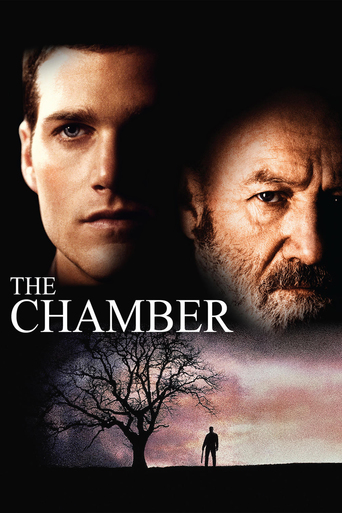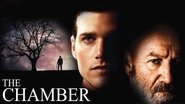moonspinner55
Gene Hackman does everything but shout "I want to live!' in this indictment of the death penalty, of the gas chamber, of hatred and bigotry, of loyalty to disreputable people, of grandstanding politicians and judges, of family shame and secrets...the list goes on and on. Film begins with a 1967 hate-crime down south attributed to a Klansman, charged with the bomb blast that killed two Jewish boys and maimed their father. Fast-forward 30 years: that Klansman, now aged and set to be executed in the Mississippi State Penitentiary in 28 days, is represented on appeal by the grandson he's never met, a young but not incompetent attorney who figures he's his grandfather's only hope. (Family loyalty gets the green light here, though the reasoning behind the kid's pursuit of this case is tenuous at best. Fans of novelist John Grisham may say "the young man's motivation is clear, to heal family wounds and to mitigate his secret shame," but that only works for a book jacket; on the screen, with N-words exploding and hate-speech spewing out of the one lively character, it's another matter.) When Chris O'Donnell is at the jail, being led down hallways and through locked doors to meet racist, grizzled old Gene Hackman--sharper and saltier than the other Death Row inmates we see--one is apt to get "Silence of the Lambs" déjà vu. Indeed, Hackman is a vile cuss who distrusts everybody, but as the drama unfolds--wherein the attorney and his grandfather learn to work together--one has to wonder if this is meant to be the heart of the material or is there something else lying in wait to surprise us. Are we supposed to be sympathetic towards Hackman's poisonous, hate-filled Sam Cayhall just because he's revealed to have a conscience deep down? Or that he didn't work alone? William Goldman and Chris Reese (a pseudonym for Phil Alden Robinson) adapted Grisham's book, and I'm guessing they weren't clear on how much redemption Sam Cayhall should be shown. It's a movie full of muddled logic, nondescript performances (save for Hackman and an overacting Faye Dunaway as Hackman's daughter) and credibility issues right from the get-go. *1/2 from ****
SnoopyStyle
Sam Cayhall (Gene Hackman) is set to be executed for a bombing thirty years ago in Mississippi that killed two Jewish boys. His grandson Adam (Chris O'Donnell) has been avoiding the hateful legacy of his Klan grandfather. The young lawyer takes on the case. His investigation reveals that others were involved and he struggles to stop the execution.Gene Hackman is a great racist but his character is irredeemable. Chris O'Donnell has his boyish looks but I don't sense the substance. Faye Dunaway is simply horrible in this one. The story is flat. The legal thriller is ultimately meaningless. Other than Hackman, this movie doesn't have much.
ThatMOVIENut
Based on the novel by legal thriller king John Grisham, 'The Chamber' deals with a hotshot young lawyer Adam (O'Donnell) who must defend his racist KKK grandfather Sam (Hackman) from the long standing death sentence for the supposed bombing of a Jewish legal firm. However, despite his grandfather's protests and nastiness, Adam suspects something bigger at work...Despite sleek direction and Hackman's stellar work as a despicable Klansman, 'The Chamber' feels like a lot of hot air. A film built around uncovering secrets and rocking the Mississippi boat wastes time on alluding to threads that are never explored, including possible corruption, political backstabbing and racial tensions, instead of focusing on the core story of a man coming to terms with his family's dark past. It's in the interactions between Sam and Adam that the film feels its sharpest, as despite their disdain, they do gradually grow closer to each other over the course of the film as both face less than pleasant aspects about their family history, and O'Donnell and Hackman work well together.When it's not there, however, the film just seems more interested in building up to nothing. There's a whole chunk devoted to a local KKK leader (played by Raymond J. Barry) that seems to imply him having some sort of influential power, and characters love going on about how Adam doesn't want to 'go digging into this', but in the end he gets taken in like a regular thug, so what was the point of making seem like the big bad? Indeed, any thread related to possible discussion of the still strong tensions among groups in the South is little more than window dressing, which is a real pity. I suspect replacing Bill Goldman with Phil Alden Robinson (credited as Chris Reese) during the writing had something to do with how choppy this script feels.Never boring, thanks to our cast (even Fray Dunaway as a ditzy Southern Belle isn't too bad) and veteran director James Foley handles tension with a sure hand, but it dramatically feels as light as the gases in the titular room.
gracescheel
Most reviews on this site, neglect to mention how vividly the film captures the racist politics of the American South at this time. The actions of all politicians reveals how difficult it can be to seek justice. They are always looking sideways. Also the crowd outside the execution site shows how easy it is to stir up mob emotion. Again, nicely laid out and captured on film. The film visually translated Grishelm's understanding of Southern culture and politics. I also thought Chris O'Donnell captured the intensity of someone who is confronting his family's past. The camera work, which holds on his face, assists in helping us to see the quiet determination with which he works. (The camera is a good replacement for the interior monologue of fiction!)I also liked the flash-backs which help him to comprehend just where his father came from and why suicide might have been a response. This film is timely today in lieu of the polarization of American politics. Scary stuff!




